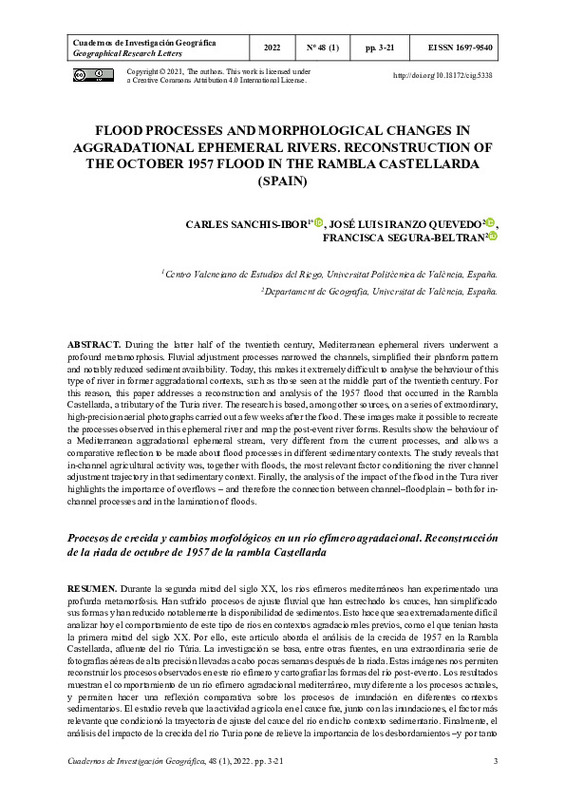JavaScript is disabled for your browser. Some features of this site may not work without it.
Buscar en RiuNet
Listar
Mi cuenta
Estadísticas
Ayuda RiuNet
Admin. UPV
Flood processes and morphological changes in aggradational ephemeral rivers. Reconstruction of the October 1957 flood in the Rambla Castellarda (Spain)
Mostrar el registro sencillo del ítem
Ficheros en el ítem
| dc.contributor.author | Sanchis Ibor, Carles
|
es_ES |
| dc.contributor.author | Iranzo Quevedo, José Luis
|
es_ES |
| dc.contributor.author | Segura-Beltrán, Francisca
|
es_ES |
| dc.date.accessioned | 2023-11-14T19:02:47Z | |
| dc.date.available | 2023-11-14T19:02:47Z | |
| dc.date.issued | 2022 | es_ES |
| dc.identifier.issn | 0211-6820 | es_ES |
| dc.identifier.uri | http://hdl.handle.net/10251/199664 | |
| dc.description.abstract | [EN] During the latter half of the twentieth century, Mediterranean ephemeral rivers underwent a profound metamorphosis. Fluvial adjustment processes narrowed the channels, simplified their planform pattern and notably reduced sediment availability. Today, this makes it extremely difficult to analyse the behaviour of this type of river in former aggradational contexts, such as those seen at the middle part of the twentieth century. For this reason, this paper addresses a reconstruction and analysis of the 1957 flood that occurred in the Rambla Castellarda, a tributary of the Turia river. The research is based, among other sources, on a series of extraordinary, high-precision aerial photographs carried out a few weeks after the flood. These images make it possible to recreate the processes observed in this ephemeral river and map the post-event river forms. Results show the behaviour of a Mediterranean aggradational ephemeral stream, very different from the current processes, and allows a comparative reflection to be made about flood processes in different sedimentary contexts. The study reveals that in-channel agricultural activity was, together with floods, the most relevant factor conditioning the river channel adjustment trajectory in that sedimentary context. Finally, the analysis of the impact of the flood in the Tura river highlights the importance of overflows - and therefore the connection between channel-floodplain - both for in-channel processes and in the lamination of floods. | es_ES |
| dc.description.abstract | [ES] Durante la segunda mitad del siglo XX, los ríos efímeros mediterráneos han experimentado una profunda metamorfosis. Han sufrido procesos de ajuste fluvial que han estrechado los cauces, han simplificado sus formas y han reducido notablemente la disponibilidad de sedimentos. Esto hace que sea extremadamente difícil analizar hoy el comportamiento de este tipo de ríos en contextos agradacionales previos, como el que tenían hasta la primera mitad del siglo XX. Por ello, este artículo aborda el análisis de la crecida de 1957 en la Rambla Castellarda, afluente del río Túria. La investigación se basa, entre otras fuentes, en una extraordinaria serie de fotografías aéreas de alta precisión llevadas a cabo pocas semanas después de la riada. Estas imágenes nos permiten reconstruir los procesos observados en este río efímero y cartografiar las formas del río post-evento. Los resultados muestran el comportamiento de un río efímero agradacional mediterráneo, muy diferente a los procesos actuales, y permiten hacer una reflexión comparativa sobre los procesos de inundación en diferentes contextos sedimentarios. El estudio revela que la actividad agrícola en el cauce fue, junto con las inundaciones, el factor más relevante que condicionó la trayectoria de ajuste del cauce del río en dicho contexto sedimentario. Finalmente, el análisis del impacto de la crecida del río Turia pone de relieve la importancia de los desbordamientos ¿y por tanto de la conexión cauce-llano de inundación¿ tanto para los procesos en el cauce como en la laminación de las crecidas. | es_ES |
| dc.description.sponsorship | This work has been funded by the research projects of the Ministry of Science and Innovation EPHIMED (CGL2017-86839-C3-1-R) and EPHIDREAMS (PID2020-116537RB-I00) , both co-financed with European funds (FEDER). | es_ES |
| dc.language | Inglés | es_ES |
| dc.publisher | Universidad de la Rioja | es_ES |
| dc.relation.ispartof | Cuadernos de Investigación Geográfica | es_ES |
| dc.rights | Reconocimiento (by) | es_ES |
| dc.subject | Floods | es_ES |
| dc.subject | Ephemeral streams | es_ES |
| dc.subject | Aggradational processes | es_ES |
| dc.subject | River forms, Rambla Castellarda | es_ES |
| dc.subject | Inundaciones | es_ES |
| dc.subject | Procesos agradacionales | es_ES |
| dc.subject | Ríos efímeros | es_ES |
| dc.subject | Formas fluviales | es_ES |
| dc.title | Flood processes and morphological changes in aggradational ephemeral rivers. Reconstruction of the October 1957 flood in the Rambla Castellarda (Spain) | es_ES |
| dc.type | Artículo | es_ES |
| dc.identifier.doi | 10.18172/cig.5338 | es_ES |
| dc.relation.projectID | info:eu-repo/grantAgreement/AEI/Plan Estatal de Investigación Científica y Técnica y de Innovación 2013-2016/CGL2017-86839-C3-1-R/ES/EVALUACION Y MODELACION DE LA RESPUESTA ECO-HIDROLOGICA Y SEDIMENTARIA EN CUENCAS MEDITERRANEAS PARA LA ADAPTACION AL CAMBIO CLIMATICO Y AMBIENTAL/ | es_ES |
| dc.relation.projectID | info:eu-repo/grantAgreement/AEI/Plan Estatal de Investigación Científica y Técnica y de Innovación 2017-2020/PID2020-116537RB-I00/ES/MONITOREO DE LA DINAMICA MORFO-SEDIMENTARIA Y TRAYECTORIAS DE RECUPERACION DE LOS RIOS EFIMEROS DEGRADADOS FRENTE AL CAMBIO GLOBAL/ | es_ES |
| dc.rights.accessRights | Abierto | es_ES |
| dc.description.bibliographicCitation | Sanchis Ibor, C.; Iranzo Quevedo, JL.; Segura-Beltrán, F. (2022). Flood processes and morphological changes in aggradational ephemeral rivers. Reconstruction of the October 1957 flood in the Rambla Castellarda (Spain). Cuadernos de Investigación Geográfica. 48(1):3-21. https://doi.org/10.18172/cig.5338 | es_ES |
| dc.description.accrualMethod | S | es_ES |
| dc.relation.publisherversion | http://doi.org/10.18172/cig.5338 | es_ES |
| dc.description.upvformatpinicio | 3 | es_ES |
| dc.description.upvformatpfin | 21 | es_ES |
| dc.type.version | info:eu-repo/semantics/publishedVersion | es_ES |
| dc.description.volume | 48 | es_ES |
| dc.description.issue | 1 | es_ES |
| dc.relation.pasarela | S\462233 | es_ES |
| dc.contributor.funder | Agencia Estatal de Investigación | es_ES |
| dc.contributor.funder | European Regional Development Fund | es_ES |
| dc.subject.ods | 06.- Garantizar la disponibilidad y la gestión sostenible del agua y el saneamiento para todos | es_ES |








